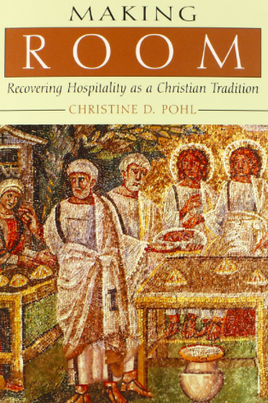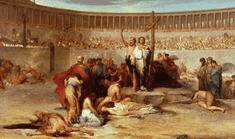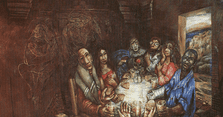 I read books that challenge me, push my convictions, and expose my idolatries. No book, recently, has done this as has Christine Pohl’s Making Room: Recovering Hospitality as a Christian Tradition as I digested page after page. As many who have the patience to read my posts and blogs, I have been rethinking church and its relationship to the poor for some time now. It’s has gotten somewhat more personal as I have been challenged to reevaluate the concept of Christian “hospitality.” Pohl reminds me that biblical hospitality isn’t entertaining friends and family, but the household extending relationships and meeting the needs of the poor and marginal, nearby and traveling through. Typically, most in the church seem to understand hospitality (or the “gift” of hospitality) to be the entertaining or hosting of those we already have some form of relationship (“established bonds”) or shared social status and “significance common ground.” Here, “[h]ospitality builds and reinforces relationships among family, friends, and acquaintances” (13). This kind of hospitality reinforces the shared social status among host and guests, wherein the guests give or affirm something by their presence to the host. Frankly put, this “kind” of hospitality is simply entertaining of guests who affirm or build the host’s social or ecclesiastical status. This is not biblical hospitality. There is commonality, that is the liminal space is shared by hosts and guests before, during, and after the act of hospitality. However, biblical hospitality is more closely related to offering space, comfort, and resources to the stranger, the poor, the marginalized—someone outside or estranged from one’s social status, whereby nothing is gained or affirmed by the hosts. This kind of hospitality, framed by the nature of the gospel itself, is for those disconnected from basic relationships and resources. As Pohl reminds, this “hospitality is central to the meaning of the gospel” (8). Thus, in a real sense,“[h]ospitality is the lens through which we can read and understand much of the gospel, and a practice by which we can welcome Jesus himself” (8). The act of hospitality is a concrete display of the gospel. Prior to hospitality, the host and guests might very well be living out a world that affirms verticality; yet the household becomes a gospel-liminal space that affirms horizontality. This reality—where the gospel is displayed, that is where a leveling of human relationships takes place amid the basic human entity, the household—is an expression of God’s kingdom. Granted biblical hospitality isn’t a mere “how to” for the Christian faith nor should be considered lightly. Yet, I cannot rethink church without considering the Christian tradition of biblical hospitality. It is stretching, convicting, and stressing me to think more deeply. Here is a series of quotes from Making Room that confront me on the issue of being Christian, having resources amid the scarcity of many, and the concept and practice of hospitality. “These hospitality communities embody a decidedly different set of values; their view of possessions and attitudes toward position and work differ from those of the larger culture. They explicitly distance themselves from contemporary emphases on efficiency, measurable results, and bureaucratic organization. Their lives together are intentionally less individualistic, materialistic, and task-driven than most in our society. In allying themselves with needy strangers, they come face-to-face with the limits of a ‘problem-solving’ or a ‘success’ orientation. In situations of severe disability, terminal illness, or overwhelming need, the problem cannot necessarily be ‘solved.’ But practitioners understand the crucial ministry of presence: it may not fix a problem but it solves relationships which open up a new kind of healing and hope” (112). “Recognizing our status as aliens in the world is important for attitudes toward resources and property. Although for most of church history private property was taken for granted, its use among Christians was sometimes moderated by the teaching that everything beyond necessity belonged to the poor. Most of the normative discussions of hospitality assumed that God had loaned property and resources to hosts so they could pass them on to those in need” (114). “In the second-century writing of Hermas we can see an important connection between alien residence and the use of resources. The Similitudes began with the claim that servants of God are living in a ‘strange country,’ far from their true home of heaven. Given their alien status, it makes little sense for believers to collect possessions, fields, or dwellings. Christians live under another law; whatever they have beyond what is sufficient for their needs is for widows, orphans, and other afflicted persons. God gives more than sufficiency for that purpose, not for making believers comfortable and vulnerable to the enticements of a strange land (Sim. 1:1–11)” (115). “If Christians live ‘in a strange land as though in [their] home country,’ they build ‘extraveagent mansions,’ and indulge in ‘countless other luxuries,’ wasting their substance on ‘inanities’ [a nonsensical action, silliness]. Because, when forced to leave the land of their sojourn they will be unable to take their possessions and buildings with them, Christians should instead use their wealth to benefit those in need” (115). Seems that much of our "church" experience affirms our cultural's values regarding social status, continues the horizontal nature of social status quo, and displays the divisions fostered already in society. The way we do church isn't neutral to the issues of poverty, racism, and wealth. Biblical Christian hospitality reverses all of this and helps us to question what we truly believe as Christians concerning our "landed" status as aliens of a different kingdom.
0 Comments
 Yes, I posted the set of most influential books I read in 2016. Yet, there are three books that have significantly moved me to rethink my gospelology (how come that’s not a word). Granted I’ve been heading this way, but in God’s gracious providence, he allowed or choose these three books to enter publication and find their way to me. The books underscored the things God has been teaching me this year. Two words can sum up what has been taught: horizontalization and leveling. The three books are:
These three books, more than anything, taught me about the two words--horizontalization and leveling--and their importance for a better, more proper understanding of the gospel and church.  I am sure I will post something soon on “horizontalization” and “leveling,” but for now, it is enough to say that God has taught me that the uniqueness of the gospel is leveling, that is, there is a leveling among believers unlike anything else upon earth. The table or the partaking of the Lord’s Supper is a leveling event (or should be). Our fellowship, i.e., our church life and worship, is a leveling of our social status’s. Whereas “leveling” is what should occur among believers and through its events of worship, the Table, baptism, and living in the world, “horizontalization” is the effects of the gospel that are displayed to the world; what outsiders, nonChristians, the unchurched, and the powers should see in and through our behavior, our habits, and our systems (i.e., the way we worship, the way we facilitate the Table, the way we do baptisms, and the way we live among people and together as a church). In other words, where such social leveling occurs, the church is displaying the horizontalization of the gospel. This is what I have been taught this year. Now, let’s see if I have learned anything. Check out my sermon on John 13, Jesus’s Community of Footwashers: His Public Presence in Caesar’s Arena of Death, that offers some of the insights on what I have been taught about "leveling" and "horizontalization." There is a link on that page for downloading the sermon and for listening to it as well (if you have the time).
|
AuthorChip M. Anderson, advocate for biblical social action; pastor of an urban church plant in the Hill neighborhood of New Haven, CT; husband, father, author, former Greek & NT professor; and, 19 years involved with social action. Archives
February 2024
Categories
All
|
Pages |
More Pages |
|
 RSS Feed
RSS Feed